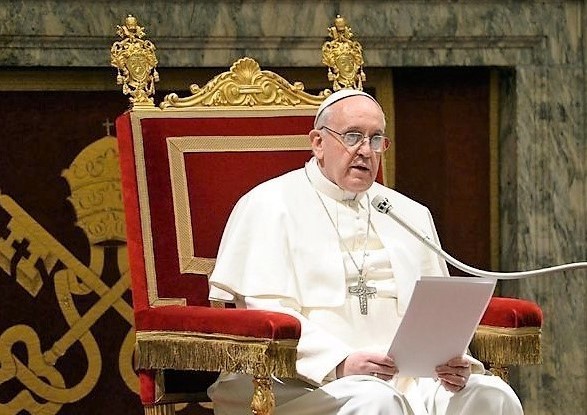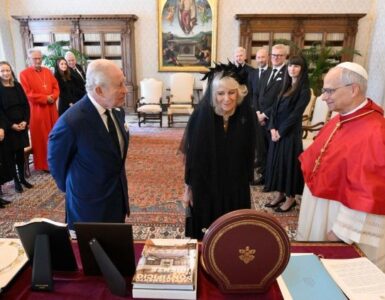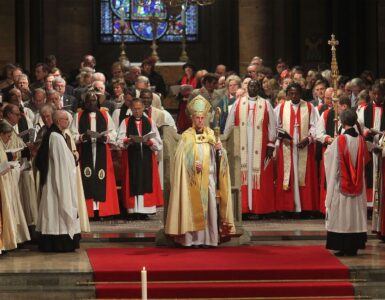Editor’s Note: The following article first appeared in the Sept. 2018 print edition of Catholic Family News (click HERE to subscribe; current subscribers can access the E-Edition HERE). In light of Pope Francis’ latest comments against capital punishment, going so far as to implicitly deride all of his predecessors in the Papacy for tolerating it, we reprint this article as it provides a thorough summary of the reasons why the death penalty remains morally licit.
*****
At the beginning of August, just days after accepting Theodore McCarrick’s resignation from the College of Cardinals (following his long-overdue exposure as a sodomite sexual predator), Pope Francis once again made international headlines by announcing his decision to “revise” the post-conciliar Catechism of the Catholic Church (CCC) concerning capital punishment. According to the new version of para. 2267, “the death penalty is inadmissible because it is an attack on the inviolability and dignity of the person” and the Church “works with determination for its abolition worldwide.”
Tellingly, this “revision” cites but a single source to “prove” its validity: a speech that Francis himself delivered in October of last year. And yet, in a companion letter addressed to the world’s bishops, the Congregation for the Doctrine of the Faith (CDF) would have us believe that “the new formulation of number 2267 of the Catechism expresses an authentic development of doctrine that is not in contradiction with the prior teachings of the Magisterium.” This is truly an absurd claim, considering that capital punishment is explicitly sanctioned throughout Sacred Scripture (e.g. Gen. 9:5-6; Rom. 13:1-4) and has been constantly affirmed as licit – even necessary, at times – by the Fathers, Doctors, and Popes throughout Church history. As Dr. Peter Kwasniewski summed it up in two consecutive columns for LifeSiteNews following the announcement, “Pope’s change to Catechism contradicts natural law and the deposit of Faith” and, “Pope’s change to Catechism is not just a prudential judgment, but a rejection of dogma”.
Answering Objections to the Death Penalty
The legitimacy of capital punishment is part of the Church’s ordinary and universal Magisterium. This means that although it has not been solemnly defined as a dogma by a pope or ecumenical council (as, for example, the sacrificial nature of the Mass at Trent, or Our Lady’s Immaculate Conception by Pius IX), it is nevertheless a constant teaching of the Church (rooted in Scripture, Tradition, and natural law) and is therefore unchangeable.
For the sake of argument, however, and to refute the novel opinion that Francis is attempting to impose on the Church, let us consider the reasons why the death penalty is not only permissible but morally good and even necessary. Our demonstration will proceed by way of answering the common objections to capital punishment as articulated by Pope John Paul II in his 1995 encyclical Evangelium Vitae (EV):
“On this matter there is a growing tendency, both in the Church and in civil society, to demand that [capital punishment] be applied in a very limited way or even that it be abolished completely. The problem must be viewed in the context of a system of penal justice ever more in line with human dignity and thus, in the end, with God’s plan for man and society. The primary purpose of the punishment which society inflicts is ‘to redress the disorder caused by the offence’ [CCC, 2266]. Public authority must redress the violation of personal and social rights by imposing on the offender an adequate punishment for the crime, as a condition for the offender to regain the exercise of his or her freedom. In this way authority also fulfils the purpose of defending public order and ensuring people’s safety, while at the same time offering the offender an incentive and help to change his or her behavior and be rehabilitated. [cf. ibid.]
It is clear that, for these purposes to be achieved, the nature and extent of the punishment must be carefully evaluated and decided upon, and ought not go to the extreme of executing the offender except in cases of absolute necessity: in other words, when it would not be possible otherwise to defend society. Today, however, as a result of steady improvements in the organization of the penal system, such cases are very rare, if not practically non-existent.
In any event, the principle set forth in the new Catechism of the Catholic Church remains valid: ‘If bloodless means are sufficient to defend human lives against an aggressor and to protect public order and the safety of persons, public authority must limit itself to such means, because they better correspond to the concrete conditions of the common good and are more in conformity to the dignity of the human person’ [CCC, 2267 – old version].” (EV, n. 56, emphasis added)
Based on this excerpt, we can identify four basic objections:
There is a “growing tendency” to oppose capital punishment and “demand” its abolition.
It supposedly violates “human dignity” to end the life of a convicted criminal.
It is unnecessary in light of modern prisons, that is, the ability of developed countries (note the qualifier) to offer life imprisonment for dangerous criminals.
It removes the possibility of criminals being “rehabilitated” in order to “regain the exercise of his or her freedom.”
As we shall see, these objections, which fall under the category of prudential judgment (i.e. subject to error), do not stand up under scrutiny.
A Growing Tendency Against Justice
The first argument against capital punishment mentioned by John Paul II concerns “a growing tendency, both in the Church and in civil society, to demand that it be applied in a very limited way or even that it be abolished completely.” This argument seems to be rooted in the belief that popular opinion is somehow a barometer of right and wrong and should guide public policy. An appropriate Catholic response to this notion is: Since when does popular opinion dictate Church teaching or practice? Since when is the Church a democracy? And more fundamentally, since when is truth subject to the will of the majority?[1]
The Church, not “the people”, is “the pillar and ground of the truth” (1 Tim. 3:15). And the Church, as mentioned above, has constantly affirmed that capital punishment is morally licit. It could not be otherwise, considering that God Himself is the Author of the death penalty, both as the general consequence for Original Sin (cf. Gen. 2:15-17, 3:1-3) and as the particular punishment for certain heinous crimes, including child sacrifice, adultery, incest, sodomy, bestiality, sorcery, and murder (cf. Lev. 20). Specifically concerning murder, God Himself explained in the days of Noah – many centuries prior to the Mosaic law – His reason for demanding death as the only fitting punishment for killing the innocent:
“For I will require the blood of your lives at the hand of every beast, and at the hand of man, at the hand of every man, and of his brother, will I require the life of man. Whosoever shall shed man’s blood, his blood shall be shed: for man was made to the image of God.” (Gen. 9:5-6)
For those who might argue that Christ did away with capital punishment, for example, by His words to the Pharisees concerning the woman caught in adultery – “He that is without sin among you, let him first cast a stone at her” (John 8:7) – Fr. John Hardon, S.J. explains:
“Christian dispensation made no essential change in this respect, as St. Paul expressly says: ‘The state is there to serve God for your benefit. If you break the law, however, you may well have fear: the bearing of the sword has its significance’ (Romans 13:4). Among the errors of the Waldenses condemned by the Church in the early thirteenth century was the proposition that denied the lawfulness of capital punishment (Argentré, Collectio de Novis Erroribus, I, 86).”[2]
Human Dignity Violated – By the Crime, Not the Punishment
Next, we move on to the objection that capital punishment supposedly violates the “human dignity” of the criminal. First of all, what about the dignity of those who have been murdered or suffered other forms of heinous abuse? Is it not the duty of the State to punish evildoers as a matter of justice? St. Paul gives us the answer in Romans 13, a verse of which was quoted by Fr. Hardon:
“Let every soul be subject to higher powers: for there is no power but from God: and those that are, are ordained of God. Therefore, he that resisteth the power, resisteth the ordinance of God. And they that resist purchase to themselves damnation. For princes are not a terror to the good work, but to the evil. Wilt thou then not be afraid of the power? Do that which is good: and thou shalt have praise from the same. For he is God’s minister to thee, for good. But if thou do that which is evil, fear: for he beareth not the sword in vain. For he is God’s minister: an avenger to execute wrath upon him that doth evil.” (Rom. 13:1-4, emphasis added)
And why is the ruler supposed to avenge capital crimes with “the sword”? Precisely because of human dignity and the violation of that dignity by those who commit murder: “Whosoever shall shed man’s blood, his blood shall be shed: for man was made to the image of God” (Gen. 9:6). This is why God insists upon death as the only just punishment for taking the life of an innocent person. After all, if the punishment is supposed to fit the crime, as John Paul II himself admitted in EV (“Public authority must” impose “an adequate punishment for the crime”), then what other punishment could possible suffice for murder?
Thus, we see that the governing authority has not only the right but the duty to “execute wrath” upon evildoers, both to uphold human dignity and to demonstrate to society at large that those in authority take crime and punishment seriously. Without such just retribution, lawlessness will abound and human dignity will be further threatened. The Roman Catechism stresses this point within the context of the Fifth Commandment:
“Another kind of lawful slaying belongs to the civil authorities, to whom is entrusted power of life and death, by the legal and judicious exercise of which they punish the guilty and protect the innocent. The just use of this power, far from involving the crime of murder, is an act of paramount obedience to this Commandment which prohibits murder. The end [i.e. purpose] of the Commandment is the preservation and security of human life. Now the punishments inflicted by the civil authority, which is the legitimate avenger of crime, naturally tend to this end, since they give security to life by repressing outrage and violence.”[3] (Emphasis added)
Regarding “the inviolability of human life” and “the dignity of the human person” (mentioned throughout EV, as well as in Francis’ “revision” of CCC para. 2267), St. Thomas Aquinas does not share the opinion that one’s dignity (and, therefore, one’s life) can never be forfeited. Consider what the Angelic Doctor says while considering the question, “Is it lawful to kill sinners?”:
“By sinning man departs from the order of reason, and consequently falls away from the dignity of his manhood, in so far as he is naturally free, and exists for himself, and he falls into the slavish state of the beasts, by being disposed of according as he is useful to others. This is expressed in Psalm 48:21: ‘Man, when he was in honor, did not understand; he hath been compared to senseless beasts, and made like to them,’ and Proverbs 11:29: ‘The fool shall serve the wise.’ Hence, although it be evil in itself to kill a man so long as he preserves his dignity, yet it may be good to kill a man who has sinned, even as it is to kill a beast. For a bad man is worse than a beast, and is more harmful, as the Philosopher states (Polit. i, 1 and Ethic. vii, 6).” (Summa Theologiae, II-II, q. 64, art. 2, emphasis added)
While St. Thomas insists that vigilantism in response to crime is itself a crime, he ultimately affirms the moral liceity of capital punishment by lawful authorities:
“…it is lawful to kill an evildoer in so far as it is directed to the welfare of the whole community, so that it belongs to him alone who has charge of the community’s welfare. Thus it belongs to a physician to cut off a decayed limb, when he has been entrusted with the care of the health of the whole body. Now the care of the common good is entrusted to persons of rank having public authority: wherefore they alone, and not private individuals, can lawfully put evildoers to death.” (Ibid., art. 3, emphasis added)
Life Imprisonment – A Viable Option Worldwide?
This brings us to Objection #3, that capital punishment is unnecessary in light of modern prisons. John Paul II argued in EV, “Modern society in fact has the means of effectively suppressing crime by rendering criminals harmless without definitively denying them the chance to reform” (n. 27), and the CDF’s recent letter explaining Francis’ “revision” of CCC quotes this text.
Two questions immediately come to mind: 1) Is it fair to force law-abiding citizens to foot the bill for the life imprisonment of anti-social and unrepentant criminals? And 2) does every “modern society” (i.e. nation on earth) truly have the ability to contain all persons found guilty of violent crimes?
The reasonable answer to both questions certainly seems to be a resounding “No.” Once again, the most fundamental purpose of punishment is just retribution for evildoing, not containment of those who pose a threat to society. John Paul II admitted as much in EV when he stated, “The primary purpose of the punishment which society inflicts is ‘to redress the disorder caused by the offence’ [CCC, 2266].” Perhaps the most compelling testimony in this regard is that of St. Dismas, more commonly known as “the Good Thief,” who rebuked his fellow criminal for taunting Our Lord while all three hung on crosses, saying: “Neither dost thou fear God, seeing thou art condemned under the same condemnation? And we indeed justly, for we receive the due reward of our deeds; but this Man hath done no evil” (Luke 23:40-41).
To say that those guilty of capital crimes – especially murder – have just as much a “right to life” as those who are innocent is a complete perversion of justice. God commanded the Israelites, “The innocent and just person thou shalt not put to death: because I abhor the wicked” (Ex. 23:7). This is simply common sense.
A secondary purpose for capital punishment (after retribution) is, of course, “the community’s welfare,” as St. Thomas teaches. Regarding said welfare, can anyone honestly guarantee that every society on earth – including the poorest and most unstable – has the ability to contain violent criminals for life? While I am certainly not an expert on the world’s prison systems, such a guarantee would seem quite dubious at best. And barring such a guarantee, does Pope Francis still consider it “inadmissible” for lawful authorities in lesser developed nations to execute convicted murderers when they cannot feasibly protect the common good by other means? (Why are there no cardinals or bishops publicly asking this basic question?)
True Rehabilitation, True Freedom
The fourth and final objection, as outlined above, is that the death penalty removes the possibility of rehabilitation and regaining of freedom for criminals. In a worldly sense, this is true: Capital punishment is permanent.[4] It is the definitive removal of all temporal good from the guilty party, not only for the sake of justice, but in hopes that being faced with the Four Last Things – Death, Judgment, Heaven, and Hell – will bring about the only “rehabilitation” that really matters: conversion. Once again, St. Dismas is the prime example: “Lord, remember me when Thou shalt come into Thy kingdom. And Jesus said to him: Amen I say to thee, this day thou shalt be with Me in paradise” (Luke 23:42-43).
Temporal punishment for sin is a reality we must all face, not because God enjoys making us suffer, but because He knows that suffering is often the only means that will bring souls to repentance, conversion, and sanctity. Part of this reality is accepting the fact that abusing our God-given free will has consequences, both internal and external. Our Lord tells us plainly that sin leads to slavery (cf. John 8:34), and St. Paul, that “the wages of sin is death” (Rom. 6:23). However, by humbly submitting to temporal punishments, we can experience real freedom from sin and escape eternal punishment in “the pool burning with fire and brimstone, which is the second death” (Apoc. 21:8).
Conclusion – A Connection to Amoris Laetitia
In my initial coverage of the now-infamous Catechism “revision”, I noted that Pope Francis seems to be getting more brazen in “pushing the envelope” when it comes to heresy. While writing the present article, it occurred to me that I should revisit the theological critique of Amoris Laetitia (made public in late July of 2016) and see how the “inadmissibility” of capital punishment measures up to the censured propositions listed in the critique. Lo and behold, I discovered something I had apparently forgotten: the very first censure is leveled against the proposition, “The Church…firmly rejects the death penalty.”
This erroneous assertion is found in n. 83 of AL and is actually a quote from the Relatio Finalis (final report) of the 2015 Synod on the Family. Looking at the full sentence in the Relatio, we read:
“Similarly, the Church not only feels the urgency to assert the right to a natural death, without aggressive treatment and euthanasia, but also takes care of the elderly, protects people with special needs, assists the terminally ill, comforts the dying and firmly rejects the death penalty (cf. CCC, 2258).” (n. 64, emphasis added)
Notice that para. 2258 of the JPII Catechism is cited as justification for the proposition. The problem is that this passage has nothing to do with capital punishment:
“Human life is sacred because from its beginning it involves the creative action of God and it remains for ever in a special relationship with the Creator, who is its sole end. God alone is the Lord of life from its beginning until its end: no one can under any circumstance claim for himself the right directly to destroy an innocent human being.” (CCC, para. 2258, emphasis added)
“Innocent human being,” not “convicted murdered.” And furthermore, the above passage is entirely a quote from the 1987 CDF instruction Donum Vitae, a document which addresses issues related specifically and exclusively to procreation.
This is trickery, plain and simple, and it serves as a good reminder that we cannot simply “take their word for it” that a given teaching is legitimate because it has a footnote. We must do our homework, check references, and refuse to go along with any of the “profane novelties” (1 Tim. 6:20) currently emanating from “evil men and seducers” who are “erring, and driving into error” (2 Tim. 3:13).
Notes
[1] Interestingly, God Himself addresses the error of “majority rule” as follows: “Thou shalt not follow the multitude to do evil: neither shalt thou yield in judgment, to the opinion of the most part, to stray from the truth” (Ex. 23:2).
[2] Fr. John A. Hardon, S.J., Pocket Catholic Dictionary (New York: Image Books, 1985), p. 60.
[3] Catechism of the Council of Trent (Rockford: TAN Books and Publishers, Inc., 1982), Part III (The Decalogue), Fifth Commandment, p. 421.
[4] As such, one would think that its lawful and timely usage would be a significant deterrent, which is in fact the case, according to scholarly studies on the subject (e.g. “Death Penalty Deters Murders, Studies Say”). Honestly, it is sad that we a scientific study in order to “prove” such a common-sense truth.




